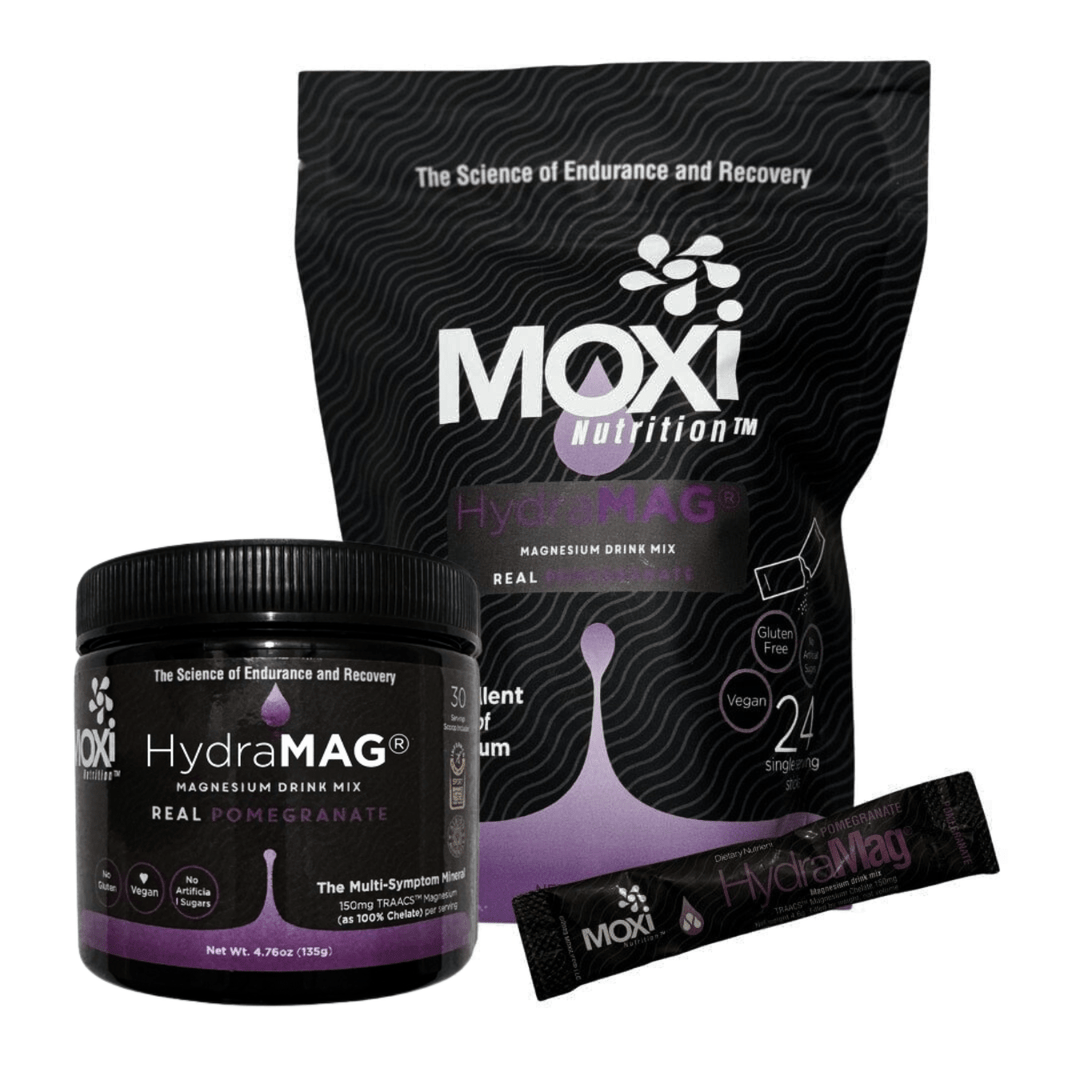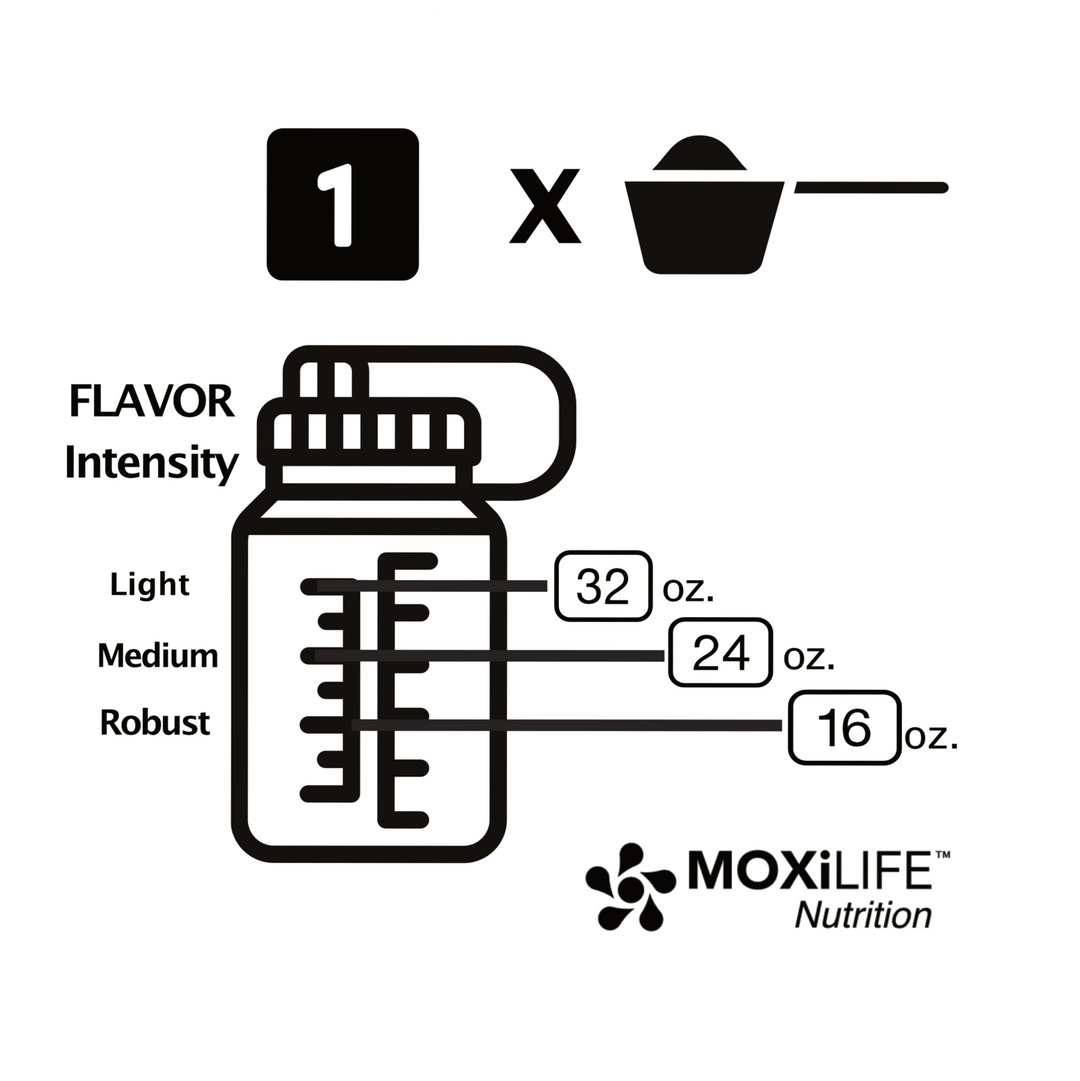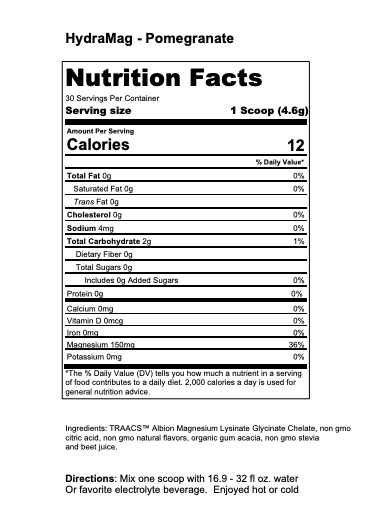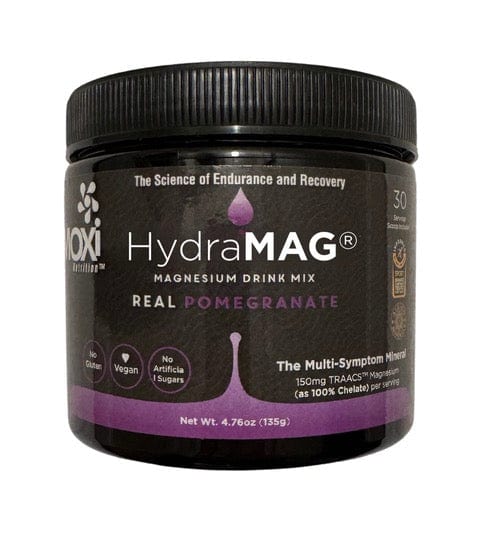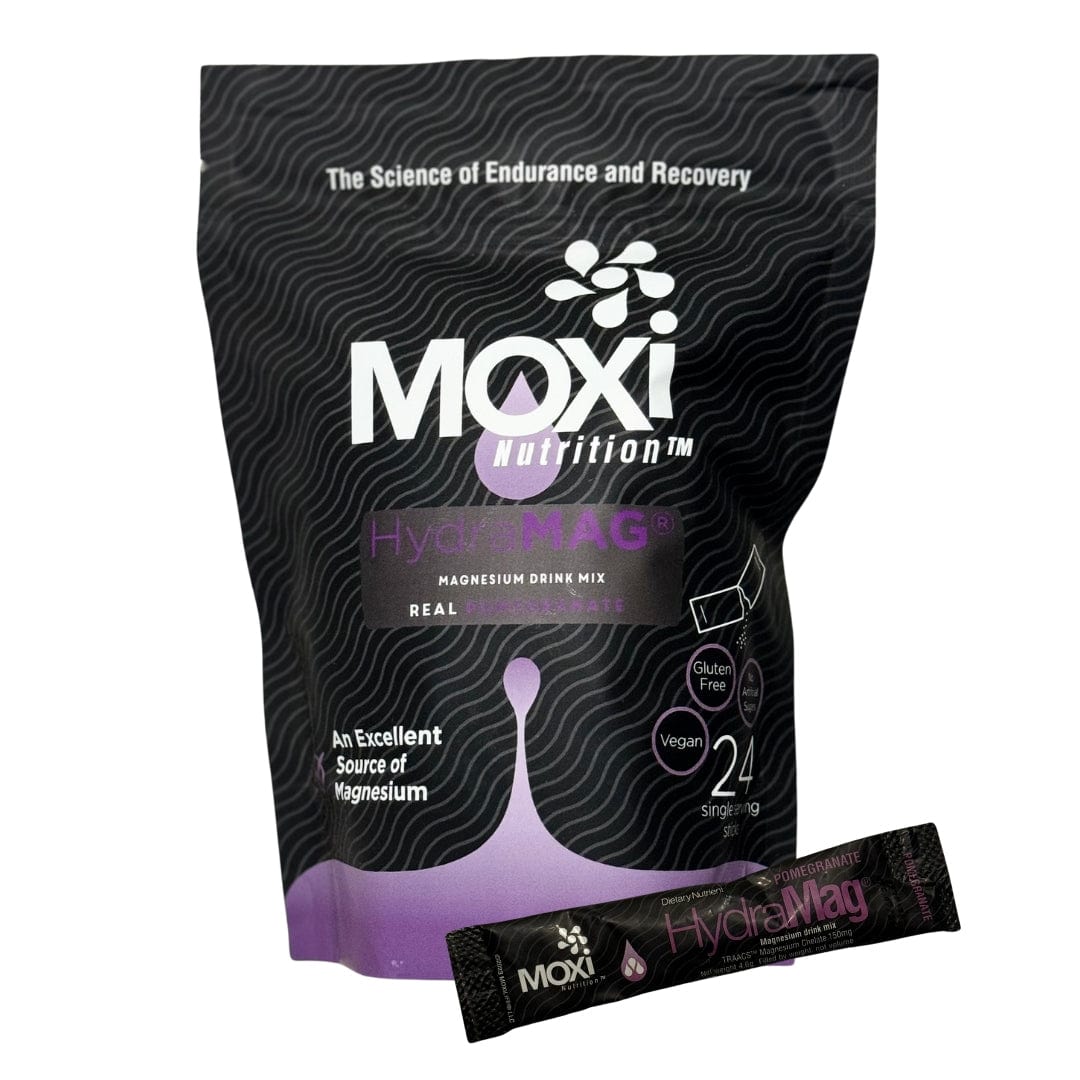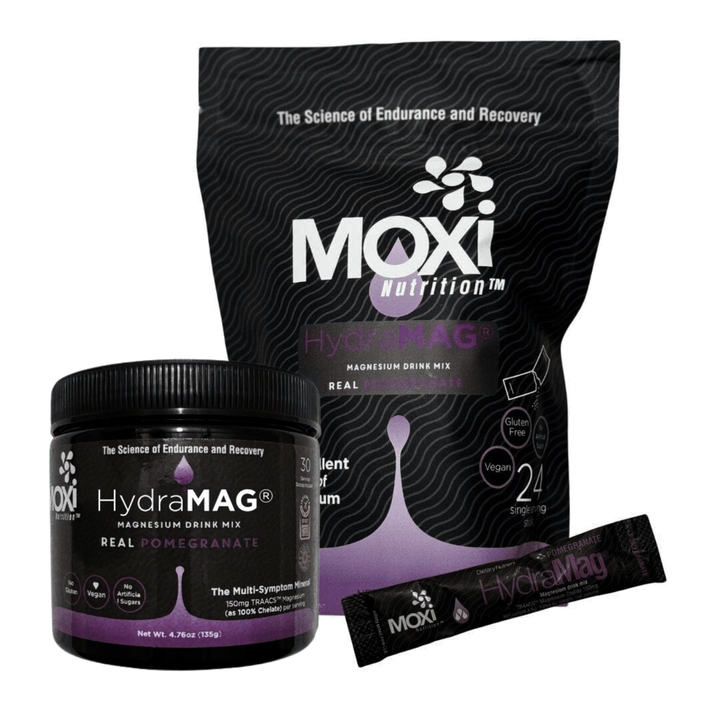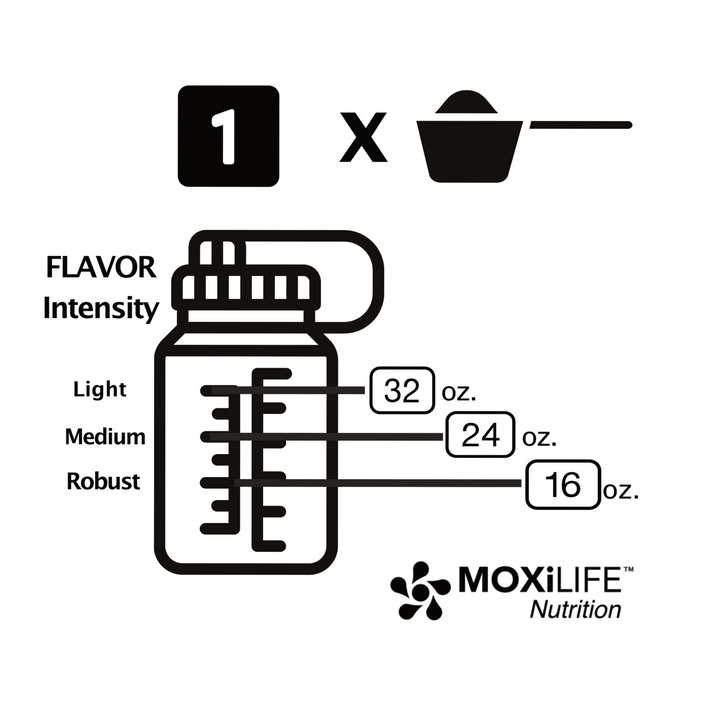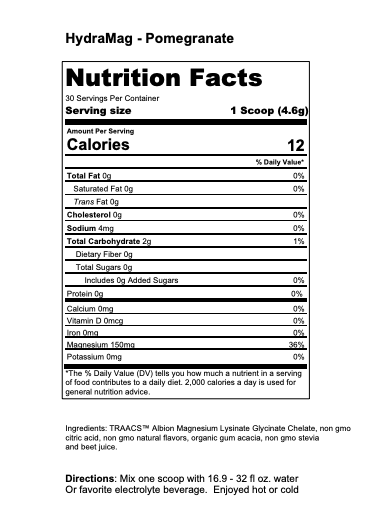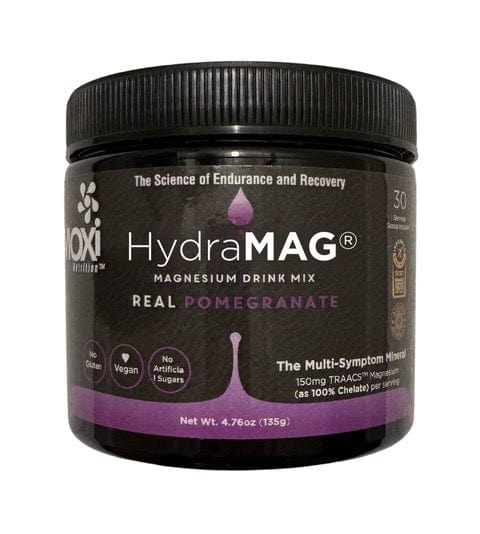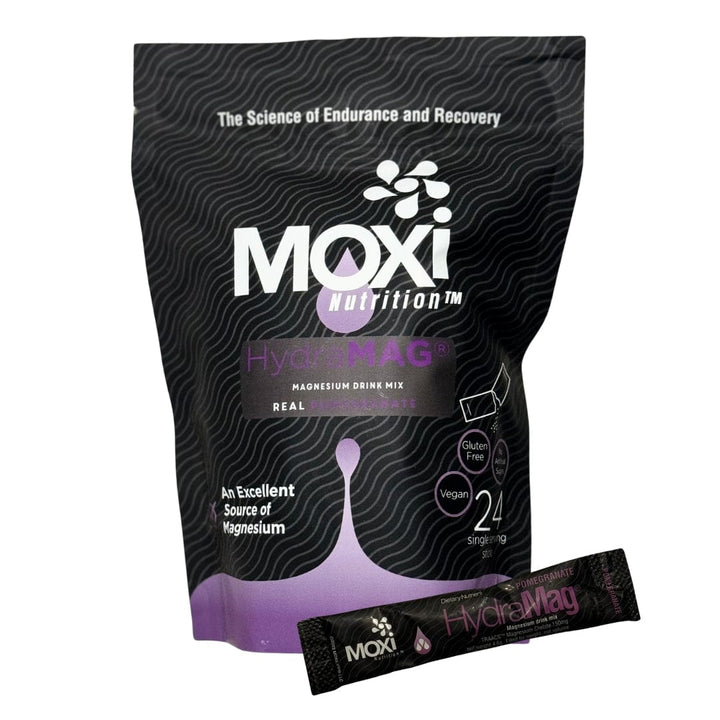Magnesium Supplement Buyer Guide.
Thanks for finding our guide and we are confident you will have a clearer picture of what magnesium supplement best suites your needs and lifestyle, when you are finished reading this magnesium buyers guide.
We will provide you some Basic and Technical information to add to your decision making process, enabling you to make the right magnesium supplement choice, for your needs.
- What is HydraMag® Magnesium
- When to buy a magnesium supplement
- How to choose a magnesium supplement based on metabolic needs
- The different types of magnesium supplements
- How to choose a magnesium supplement
- What happens when you take too much magnesium
What is HydraMag® Magnesium?
HydraMag® magnesium is a zero sugar powdered drink mix, designed to be added to water and formulated with a 100% Magnesium chelate for complete absorption and faster reduction of Magnesium deficiency symptoms. HydraMag® is a delicious Magnesium Supplement enjoyed in hot, room temperature or cold water. HydraMag® can be enjoyed while exercising, or as a daily magnesium hydration drink.
HydraMag® Magnesium drink benefits include: energy, muscle hydration, Individuals will sleep better, increase flexibility, burn carbohydrates more efficiently, reduce lactic acid following exercise, balance the endocrine and metabolic system, and may prevent muscle cramping

We suggest enjoying 2x daily if experiencing Magnesium Deficiency symptoms, or 1x Daily to insure 1/3 of your RDI requirements are met.
We small batch blend our mix using concentrated real Pomegranate flavor, real beet juice, & South American Stevia. Our products are Gluten Free and safe for children and insulin resistant individuals.
No fillers or unnecessary additives are used in our blending and manufacturing process. We hand select and vet each ingredient used in MOXiLIFE Nutrition to insure safety and efficacy.
When to buy a magnesium supplement?
You must be questioning, or have heard about the benefits of magnesium, if you have reached this page of your research. There are so many products available on the market, and so much magnesium information, it can be overwhelming with some information conflicting and contrary. As an endurance athlete, and someone formerly plagued by continual magnesium deficient issues: cramping, restless sleep, hormonal fluctuations, I have made "metabolic" peace and now have the pleasure of not experiencing the aforementioned issues.
Let us provide some basic; and technical, information to help you make the best decision for you.
Below are the Chronological Order of events we suggest, to help guide you to making a good buying decision.
Testing Your Magnesium biomarkers:
Basic Information:
We first suggest that you obtain data; on your body, prior to making any supplement decision. By data we suggest having a medical exam or a blood evaluation to determine what your body’s levels are, prior to spending money on any supplement.
Technical:
Since the body requires a ‘consistent’ circulation of magnesium; for all cells, at all times, the body will take from magnesium storage sites to pull from to make sure the body is getting an ample supply of magnesium at all times. These storage sites are located in all muscles and bones.
Over 90% of the ‘blood serum’ test results return magnesium biomarkers within the ‘normal range’ because of the consistent physiological requirements of the body.
To date, one of the most accurate and convenient test for indicating magnesium levels is called a Magnesium Red Blood Cell Test, Mg RBC test. The MgRBC test is not covered by insurance however this test can be ordered online, requires no insurance & is less than $80
Evaluating your Mg Deficiency Symptoms:
Our medical community uses traditional blood serum test results, as the primary source of information for most every biomarker, Blood serum test results may not be accurate if you continue to exhibit the following symptoms.
- Muscle cramping: Exercise or for women excessive cramping during menstruation
- Muscle twitching/ fasciculation’s: eyelids, legs, arms, feet
- Headaches & migraines
- Irregular sleep
- Cardiovascular Maladies: family heart history, Atrial Fibrilation, SVT; Super-ventricular tachycardia,
- Insulin sensitive: pre diabetic, diabetic
- Thyroid malfunctions
- Excessive sodium output in sweat
- Slower recovery from workouts: muscle soreness, fatigue
- Stress fractures
How to choose a magnesium supplement? Is your decision based on metabolic needs, or alternative desired outcomes?
If you currently exhibit any of the above symptoms and or received test results indicating low Mg biomarker blood levels, you can benefit from supplementing with Magnesium.
Basic Information:
Magnesium is a mineral. Minerals are ONLY obtained through external food and supplement sources. Minerals are known as ESSENTIAL NUTRIENTS. Each individual requires a unique an=mount of minerals to service all functions in the body and the RDI (Recommended Daily Intake) is the BASIC minimum nutrient levels required to keep our bodies functioning.
Men 420mg/Daily
Women 380mg/Daily
Athletes require 20-30% more Magnesium to optimize metabolic and muscle functions.
The key to magnesium supplementation benefit, is to get it inside (absorbed) your body, enabling the body to use(bioavailability) via cellular, vascular and lymphatic pathways.
Magnesium provided as an intravenous drip, is the fastest means of achieving magnesium benefits of negative physiological magnesium deficiency symptoms. [ER’s have been known to provide Mg intravenously with heart attack patients.]
As consumers we do not have this luxury at our fingertips, so the best means to the end is to provide our bodies with a daily level of a high absorbing magnesium supplement.
Technical:
Whether you are seeking relief from:
-
Organs: Heart, Thyroid, Kidney
-
Muscle: Cramping, twitching
-
Cognitive: Anxiety, depression, Sleep
-
Metabolic Maladies: Insulin sensitivities
or seeking:
- Elevated physical performance
- Changing metabolism
The bodies ‘tolerance’ will play a role in how your body accepts various forms of magnesium. By ‘tolerance’ we indicate the digestive systems ‘acceptance’ of the type of magnesium used for treating your ailment, symptom or desired outcome.
Each individual has a genetic set of proteins/amino acids; TRPM (transient receptor potential melastatin), which actively help transport magnesium, into and throughout, the body.
Every individual is different and has various levels of TRPM in their system.
The recent research on TRPM, may be the best understanding of symptoms associated with Magnesium deficiency, and why individuals are susceptible to cardiovascular and insulin sensitivities and diseases.
These protein/amino acids, provide a clearer window to ‘particular mineral forms’ being better absorbed than others.
Clinical studies have shown, mineral chelates(Key-Lates), as the best absorbed minerals currently known and researched. A mineral ‘chelate’, is a specific delivery system, ‘bonding’ magnesium to amino acids , elevating intestinal mineral uptake.
This amino acid delivery system may be the key indicator, based on what we now know from the TRPM, as to why Magnesium chelates are superior to other Magnesium forms, which are not bonded to amino acids.
To date, one of the most well respected manufactures of health minerals is Albion Minerals™. Albion Minerals has conducted the most targeted clinical human & lab studies on minerals, and in particular, magnesium. They have manufactured mineral chelates (Key-Late) for close to 60 years.
Albion Minerals™ has close to 200 human clinical mineral studies showing positive convincing outcomes of mineral use as a natural remedy too many types of physical ailments.
The different types of magnesium supplements, which is most conducive to my life?
Convenience and consistency are important factors when considering supplementation of any nutrient.
Finding a supplement that fits YOUR LIFESTYLE will provide you the best positive outcomes.
There are many ‘types’ of Magnesium available to consumers. The following are commonly found in the marketplace:
Non Amino Acid Bonded Magnesium:
- Magnesium Oxide
- Magnesium Carbonate
- Magnesium Citrate
- Magnesium Sulfate
- Magnesium Lactate
- Magnesium Glycinate
Amino Acid Bonded Magnesium
- Magnesium Chelates: BisGlycinate Chelate: Lysinate Glycinate Chelate
- Magnesium Threonate
Basic Information:
Convenience and consistency are important factors when considering supplementation of any nutrient.Finding a magnesium supplement that fits YOUR LIFESTYLE will provide you the best positive outcomes.
For natural supplementation to work, you need to take a few factors into consideration, and ask yourself:
- Will you be willing to take a few pills daily?
- Would you prefer a tablet or a capsule?
- Does the amount of pills and or tablets affect your compliance to a supplement program?
- Do you have problems swollowing pills and or capsules?
- Would you prefer to drink a supplement?
- Does the taste have an impact on your supplements?
- Do you currently have a routine of making daily shakes?
- Are you taking pharmaceutical medications that impact the way your body uses nutrients?
- Has your doctor recommended not taking medications with supplements?
- What is your ‘tolerance’ with magnesium?
You also need to understand that natural nutrients, are unlike pharmaceuticals. Pharmaceuticals are designed to target specific symptoms and provide immediate masking ‘relief’.
Natural nutrients provide a long term foundation to health, much like a house’s foundation. The body needs nutrients; vitamins, minerals, protein fats and carbs to sufficiently create a healthy foundation.
Technical:
Mineral chelates are naturally formed in our bodies.Our bodies naturally bond minerals to amino acids. The chemical bond created between the mineral and the amino acid requires certain factors in place, to enable this process to occur.
Our bodies naturally 'chelate' inside the intestinal tract with the help of stomach acids, Ph levels, available amino acids, gastrointestinal integrity, interaction of foods, and an individuals health. The amount of stress affects all of these chemical functions in the system, affecting the body and its ability to properly absorb nutrients and minerals.
A chelate is formed when the electrons between the amino acid(s) and the mineral are shared between each separate atom, creating a ‘new’ molecule; aka chelate.
This new structure is what makes the mineral a ‘chelate’ and is why the body absorbs and recognizes it better and faster than a mineral that does not have this bond.
The interrelationship between this new magnesium chelate mineral and TRPM proteins may have a positive effect on elevated absorption.
Whether magnesium is absorbed into the body is the ONLY factor which positively changes your internal chemistry.
When magnesium is not ‘absorbed’ into the body is what creates adverse events, such as: laxation, diarrhea or loose stools and inadequate results.
Magnesium is hygroscopic; attracts water.
When left in the intestinal tract it attracts water from your body and brings it into your intestinal tract. The more water in your intestinal tract helps flush the waste management system.
How to choose a magnesium supplement?
We now have some information as to the technical and basic aspect to Magnesium Supplements.
Depending on your; needs, level of consistency and compliance will determine your beneficial outcome.
What is your desired objective or End Goal for taking a magnesium supplement?
The Top 2 Reasons to take Magnesium Supplements and which magnesium forms will work best:
1. Alleviate magnesium deficiency symptoms, enhance exercise performance and positively change internal biomarkers
Magnesium Chelates: BisGlycinate Chelate: Lysinate Glycinate Chelate
Magnesium Threonate
Magnesium Glycinate: may or may not be listed as a ‘chelate’.
If there is no chelate reference or label indication, you may have low tolerability, and result with an adverse event.
- Constipation and Clinical Bowel Relief:
The below magnesium forms have been used in clinical environments to create bowel movements for pre colonoscopy procedures, and for digestive relief

Magnesium Oxide
Magnesium Carbonate
Magnesium Citrate
Magnesium Sulfate
Magnesium Lactate
Magnesium Glycinate
Magnesium Gluconate
What happens when you take too much magnesium?
Our body’s require sufficient amounts of magnesium to help over 600 enzymatic cell functions. Cellular communication is dependent on energy as is most chemical reactions between cells Research has proven, ATP Energy to be non existent without Magnesium.
In other words, we cannot create energy without magnesium.
Magnesium can have adverse affect on the body if taken in high levels and doses, over an extended time frame. The effective use and bioavailability of magnesium in your system depends on your base line health.
Excessive use of magnesium for constipation will ultimately create a negative looping effect. The body becomes continually dehydrated due to the previously described non amino bonded magnesiums affect on the intestinal system. The body will also be unable to create necessary digestive enzymes.
Excessive amounts of magnesium will affect muscle and organ functions.
This includes all CNS functions from the brain to bowel movements.
The first signs of magnesium overuse will be a tolerance factor; increased bowel movements. This is natures natural line of defense. If for health reasons and preexisting conditions prevent the basic tolerance levels to not kick into play, the organs will be affected by means of slowing down. Since magnesium helps balance Calcium; the excitatory mineral, and excessive amount will create an imbalance to an imbalanced state of relaxation.
The heart will slow down, breathing will become labored and muscles will become excessively relaxed.
These adverse affects normally will not be reached unless ‘excessive’ amounts of magnesium are used intravenously and or at maximum daily levels. These levels are closer to 3grams hourly however with unhealthy kidneys this amount may be less.





